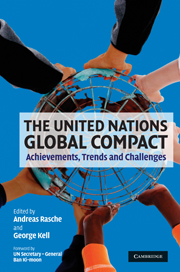Book contents
- Frontmatter
- Contents
- List of figures
- List of tables
- List of boxes
- List of abbreviations
- List of contributors
- Acknowledgements
- Foreword
- Why This Book Matters!
- The Ten Principles of the United Nations Global Compact
- 1 Introduction: the United Nations Global Compact – retrospect and prospect
- Part I Achievements, trends and challenges: reflections on the Principles
- Part II Participants and engagement mechanisms
- 7 Implementing the United Nations Global Compact
- 8 Academic institutions and the United Nations Global Compact: the Principles for Responsible Management Education
- 9 Corporate responsibility and the business school agenda
- 10 NGOs and the United Nations Global Compact: the link between civil society and corporations
- 11 Financial markets and the United Nations Global Compact: the Principles for Responsible Investment
- 12 Learning from the Roundtables on the Sustainable Enterprise Economy: the United Nations Global Compact and the next ten years
- 13 The United Nations Global Compact as a learning approach
- Part III Governance and Communication on Progress
- Part IV Local Networks: the emerging global–local link
- Glossary
- Bibliography
- Index
8 - Academic institutions and the United Nations Global Compact: the Principles for Responsible Management Education
Published online by Cambridge University Press: 05 February 2012
- Frontmatter
- Contents
- List of figures
- List of tables
- List of boxes
- List of abbreviations
- List of contributors
- Acknowledgements
- Foreword
- Why This Book Matters!
- The Ten Principles of the United Nations Global Compact
- 1 Introduction: the United Nations Global Compact – retrospect and prospect
- Part I Achievements, trends and challenges: reflections on the Principles
- Part II Participants and engagement mechanisms
- 7 Implementing the United Nations Global Compact
- 8 Academic institutions and the United Nations Global Compact: the Principles for Responsible Management Education
- 9 Corporate responsibility and the business school agenda
- 10 NGOs and the United Nations Global Compact: the link between civil society and corporations
- 11 Financial markets and the United Nations Global Compact: the Principles for Responsible Investment
- 12 Learning from the Roundtables on the Sustainable Enterprise Economy: the United Nations Global Compact and the next ten years
- 13 The United Nations Global Compact as a learning approach
- Part III Governance and Communication on Progress
- Part IV Local Networks: the emerging global–local link
- Glossary
- Bibliography
- Index
Summary
As teachers, you can ensure that tomorrow's leaders understand that the long-term growth of business is tied to its environmental and social impact. As scholars, you can produce research that drives innovation and helps management to recognize the benefits of being a responsible business. And as thought leaders and advocates in your communities, you help advance awareness of broader challenges, opportunities and responsibilities.
UN Secretary-General Ban Ki-moon (see United Nations 2008)Introduction
The United Nations Global Compact was created both to close global governance gaps in commerce and as a means to set universal standards for moral behaviour, globally. The goals of the United Nations Global Compact are to encourage the adoption of the ten business principles worldwide and to promote support of broader United Nations initiatives, in particular the Millennium Development Goals (MDGs) aimed at worldwide poverty reduction. Although focused on commerce, the membership of the Global Compact is wide-ranging and includes non-governmental organizations (NGOs), academic institutions and governments, as well as corporations.
There has never been a time, historically, when commerce has not faced serious ethical issues. As early as 1800 BC the Mesopotamian ruler, Hammurabi, developed a code of ethics for the conduct of trade and commerce, an obvious reaction to some questionable behaviours that occurred at that time. Regrettably, questionable behaviours in business practices continue to occur.
- Type
- Chapter
- Information
- The United Nations Global CompactAchievements, Trends and Challenges, pp. 144 - 160Publisher: Cambridge University PressPrint publication year: 2010
- 5
- Cited by



